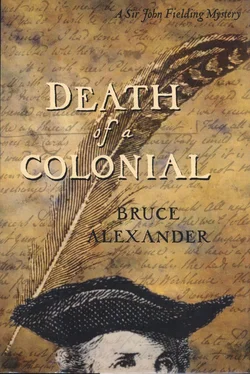Bruce Alexander - Death of a Colonial
Здесь есть возможность читать онлайн «Bruce Alexander - Death of a Colonial» весь текст электронной книги совершенно бесплатно (целиком полную версию без сокращений). В некоторых случаях можно слушать аудио, скачать через торрент в формате fb2 и присутствует краткое содержание. Год выпуска: 1999, ISBN: 1999, Издательство: Putnam Adult, Жанр: Исторический детектив, на английском языке. Описание произведения, (предисловие) а так же отзывы посетителей доступны на портале библиотеки ЛибКат.
- Название:Death of a Colonial
- Автор:
- Издательство:Putnam Adult
- Жанр:
- Год:1999
- ISBN:9780425177020
- Рейтинг книги:3 / 5. Голосов: 1
-
Избранное:Добавить в избранное
- Отзывы:
-
Ваша оценка:
- 60
- 1
- 2
- 3
- 4
- 5
Death of a Colonial: краткое содержание, описание и аннотация
Предлагаем к чтению аннотацию, описание, краткое содержание или предисловие (зависит от того, что написал сам автор книги «Death of a Colonial»). Если вы не нашли необходимую информацию о книге — напишите в комментариях, мы постараемся отыскать её.
Death of a Colonial — читать онлайн бесплатно полную книгу (весь текст) целиком
Ниже представлен текст книги, разбитый по страницам. Система сохранения места последней прочитанной страницы, позволяет с удобством читать онлайн бесплатно книгу «Death of a Colonial», без необходимости каждый раз заново искать на чём Вы остановились. Поставьте закладку, и сможете в любой момент перейти на страницу, на которой закончили чтение.
Интервал:
Закладка:
“Is it then so doubtful?”
“Well … let me say only what I have heard: to wit, that he does not perfectly resemble the young man who left for the colonies eight years ago.”
“Do be more specific, Lord Mansfield,” said Mr. Trezavant.
“He has, so they say, grown a bit — not merely filled out but acquired an inch or two in height, as well. Not impossible for one in his twenties, yet not likely, either. His manner of speech is also questionable. There are, in sum, any number of discrepancies — matters that might seem. . oh, not quite right to the interested observer.”
“Ah, well,” said Mr. Trezavant, “perhaps he may not prove so difficult an obstacle, after all.”
Ignoring him rather pointedly, Lord Mansfield continued: “One might say he is so little like his old self that his claim to be Lawrence Paltrow would probably not be taken at all seriously were it not for the fact that Margaret Paltrow, the mother, has recognized him as her son and herself signed an affidavit to that effect in the presence of a solicitor. “
“The mother?” echoed Mr. Trezavant, quite crestfallen. “Oh, my, oh, dear.”
“What, then?” put in Mr. Daliymple. “How will he proceed? Who passes judgment on his claim? I’m quite ignorant of these matters.”
Rather tellingly, all turned then to Sir John, who, blind, was ignorant of this tribute to his greater knowledge. Yet as silence reigned, and thinking no doubt that the answer could come only from him, Sir John cleared his throat and spoke up at last: “I believe it would go again to the House of Lords. A Letter of Patent would be written, accompanied in this case by affidavits, statements, and whatever other documentation he may have collected. If disputed by the claimant or any other interested party, the decision of the House of Lords would be brought to Chancery Court.”
At that, there were groans in chorus.
But somewhat in the manner of a teacher calling the class to order, Lord Mansfield chided them. “Gentlemen, please,” said he. “Chancery Court is operating much more efficiently these days — though I admit it is in our own best interest — and the King’s — to keep the case out of Chancery. But tell me, Mr. Hemmings, you, who are most experienced in these matters, have not spoken at all. What have you to say? Give us some benefit of your wisdom and experience.”
Mr. Hemmings returned the gaze of the Lord Chief Justice as one perfectly sure of himself would do. He was a canny sort, well into his sixth decade of life, yet more lively than many a younger man.
“You flatter me, m’lord — and to no good purpose, I fear,” said Mr. Hemmings quite bluntly. “As you well know, I am not one for making plans and theories and such. It’s true I have had some experience in these matters, enough to know a few things about this one. What I know, first of all, is that Sir John Fielding is quite right: There is no chance of the King’s entitlement to the Laningham fortune through Arthur Paltrow; our only hope is to discredit the claim of his younger brother — if indeed the claimant be truly his brother. And if possible, that must be done swiftly — even before it reaches the House of Lords. I have a good notion of why I was recruited for this group, and it is because of my known expertise in surveying and estimating wealth. I can only assume that you want a price put upon the Laningham fortune — and quickly. I suspect it will be sold off within the year.”
“Perhaps not all of it, “ said Lord Mansfield with a sly smile and a bit of a wink.
“What do you know that we do not?” asked Mr. Dalrymple.
“Oh, do tell us, m lord,” said Mr. Trezavant.
“Well, as I understand it, “ said Lord Mansfield, “the King has his regal heart set upon the Laningham country house and estate as a palace for the Prince.”
“For the Prince of Wales? “ blurted out Trezavant. “He is but nine years old.”
“To be given him when he reaches his majority, of course.”
“Ah, well, that makes better sense.”
“It seems that the King visited there of a night some years back and was immediately taken by the place.”
“And now the place will be taken by him !” Mr. Trezavant crowed in jolly fashion at his own witticism; none joined with him.
“Yes, well, what the King does with it is of no consequence to us,” said Lord Mansfield. ‘But Mr. Hemmings has brought up an interesting point. In fact, he is correct. My intention is to request him to survey the wealth and holdings that the Laningham fortune comprises. He will be compensated for his work quite generously, as indeed you all will be — for, yes, I have tasks for one and all.”
“Sir John?”
“Yes, Jeremy, what is it, lad?”
“The Lord Chief Justice gave you no task, did he? He did simply skip over you, did he not?”
“Oh, he may have done, but then again he may not.”
There, for certain, was a puzzler. What had he meant by that? “I … do not quite understand, sir.”
“Simple enough,” said he. “It’s true that Lord Mansfield announced nothing for me, which disappointed me not in the least. But then — I thought you surely would have noticed — as the meeting ended and we filed out, he slipped something into my coat pocket, a letter. Quite surprised me, he did. I suspect that the letter has in it some special and specific duty he wishes me to perform.”
“You have it with you now?”
“Why, yes, of course.”
“Then, would you like me to read it to you? “
“Here? Now?”
In truth, this hardly seemed the time or place, for we were making our way back to Number 4 Bow Street, once again surrounded by the great multitude in Drury Lane, stepping along at a brisk pace.
“Well, perhaps not,” said I, “but there is a coffee house just ahead that might serve the purpose.”
Sir John gave that some lengthy consideration. “No, “ said he, having weighed the matter sufficiently, “I think not. I believe I am less curious about the matter than you. Having so little enjoyed the last hour, or half-hour, or whatever the length of the meeting may have been, I simply wish to put it out of my mind for as long as possible. I agree, Jeremy, that the letter must eventually be read, but grant me please something of a recess from that band of pettifoggers and spies.”
“Spies, Sir John? All of them, sir?”
“Oh, perhaps not the Lord Chief Justice. He is what he is, and far worse and less able men have held his position. He owes nothing to any man. I suppose I would also except George Hemmings, a mean man, perhaps, but unafraid to speak his own mind. But the other two? I daresay Trezavant has run off already to tell the Prime Minister what transpired. And Dalrymple, who is well known as Sir Patrick Spenser’s great friend, will now have put his head together with the Solicitor-General.”
“But Sir Patrick will receive my minutes of the meeting, will he not?”
“Oh, yes, and I’m sure that after they have been improved upon, they will make interesting reading for the King. “
“But I kept a good record of the meeting, sir — quite accurate as to content. Mr. Marsden taught me how. Why should it be necessary to improve upon it?”
“So that it be made to say what Sir Patrick wishes it to say.”
“But that is unfair — and no doubt illegal, too.”
“No, not illegal,” said Sir John, “simply immoral.”
We went past the Drury Lane Theatre, swept along by the crowd as evening was coming on. The sun, declining in the west, gave light of a distinctly muted character. In little more than an hour, dim twilight would cover all London. I vowed to say no more to Sir John about the letter which, even then, protruded from his coat pocket. Though curious, I had my dignity to maintain. If he wanted it read to him, he would have to ask me.
Читать дальшеИнтервал:
Закладка:
Похожие книги на «Death of a Colonial»
Представляем Вашему вниманию похожие книги на «Death of a Colonial» списком для выбора. Мы отобрали схожую по названию и смыслу литературу в надежде предоставить читателям больше вариантов отыскать новые, интересные, ещё непрочитанные произведения.
Обсуждение, отзывы о книге «Death of a Colonial» и просто собственные мнения читателей. Оставьте ваши комментарии, напишите, что Вы думаете о произведении, его смысле или главных героях. Укажите что конкретно понравилось, а что нет, и почему Вы так считаете.












